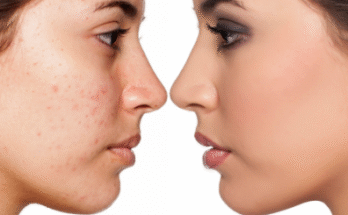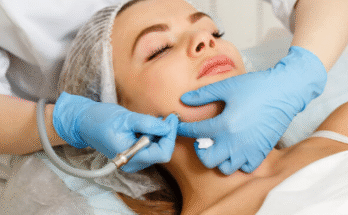Exfoliation is one of those skincare steps that people often either love or fear. When you have acne, it can feel even more complicated.
On one hand, exfoliating helps clear away dead skin cells that clog pores and contribute to breakouts. On the other, scrubbing too hard or using the wrong products can worsen inflammation and leave skin feeling sore or red.
The good news is that you do not have to give up exfoliation if you are acne-prone. With the right approach, you can enjoy the benefits of smoother, clearer skin without irritation.
Understanding What Exfoliation Does
Exfoliation is the process of removing the top layer of dead skin cells. Your skin naturally sheds these cells, but sometimes they build up and mix with oil and bacteria. This buildup can clog pores, which leads to blackheads, whiteheads, and breakouts. Exfoliation gives the skin a helping hand by speeding up the renewal process and creating a surface that looks brighter and feels softer.
There are two main types of exfoliation. Physical exfoliation involves using tools or particles to manually scrub off dead skin cells. Chemical exfoliation uses acids or enzymes to dissolve the bonds that hold these cells together. Both methods can work for acne-prone skin, but they must be chosen carefully to avoid triggering irritation.
Why Gentle Exfoliation Matters for Acne
When acne is active, the skin is already inflamed. Harsh scrubbing or using strong acids can strip away the skin’s protective barrier, leading to more redness, sensitivity, and even worsening breakouts. Over-exfoliating can also cause micro-tears in the skin, which makes it easier for bacteria to spread. That is why the focus should be on gentle, consistent exfoliation rather than aggressive methods. A little goes a long way when your skin is healing.
Choosing the Right Type of Exfoliant
Not all exfoliants are created equal, and the best choice depends on your skin type and acne concerns. For those with sensitive or inflamed skin, chemical exfoliants are often less irritating than scrubbing with beads or brushes. Ingredients like salicylic acid, which is oil-soluble, can penetrate the pores and help unclog them while reducing inflammation. Glycolic acid, derived from sugarcane, is water-soluble and works well to smooth uneven texture and brighten dull skin. Lactic acid is gentler and can also provide hydration.
Physical exfoliation is not always off-limits, but it should be approached with caution. Very fine, smooth scrubs or soft washcloths can be used occasionally, but rough scrubs with large particles should be avoided. The key is to keep pressure light and use these methods sparingly.
How Often Should You Exfoliate?
One of the most common mistakes people make is exfoliating too frequently. When dealing with acne, less is often more. Two to three times a week is usually enough for most skin types, but if your skin feels sore or sensitive, scaling back to once a week may be best. Pay attention to how your skin responds. If you notice dryness, redness, or more breakouts, that is a signal to slow down. Consistency and patience yield better results than rushing the process.
Prepping Your Skin Before Exfoliation
Preparation is just as important as the exfoliation itself. Start with a gentle cleanser to remove dirt, oil, and makeup. Avoid cleansers that leave your skin feeling tight or stripped, as this is a sign that your natural oils have been removed too aggressively. Pat your skin dry with a soft towel rather than rubbing it. By starting with clean, calm skin, you reduce the risk of irritation when you apply your chosen exfoliant.
Tips for Exfoliating Without Irritation
Think of exfoliation as a mindful ritual rather than a quick scrub. Use a small amount of product and let the ingredients do the work rather than relying on force. If using a chemical exfoliant, apply it evenly and allow it to absorb. Follow the instructions on the product label and avoid layering multiple exfoliants at once. Mixing strong acids or scrubs can overwhelm your skin and trigger inflammation.
After exfoliating, it is essential to restore balance. Apply a lightweight, soothing moisturizer that replenishes hydration and calms any sensitivity. Look for products with ingredients like aloe vera, ceramides, or hyaluronic acid. This step helps lock in moisture and strengthens your skin barrier.
Sun Protection After Exfoliation
Freshly exfoliated skin is more vulnerable to the sun’s rays. Even if you are indoors most of the day, some ultraviolet light can still reach you. Applying a broad-spectrum sunscreen every morning is non-negotiable, especially after exfoliation. This not only protects your skin from sunburn but also prevents dark spots and scarring from acne.
Avoiding Common Exfoliation Mistakes
It is easy to think that more exfoliation means faster results, but overdoing it almost always backfires. Using multiple exfoliating products at once, skipping moisturizer, or scrubbing aggressively are habits that can make acne worse. Another mistake is ignoring how your skin feels. If you notice stinging, peeling, or persistent redness, it is your skin telling you to slow down and give it time to heal.
Listening to Your Skin
Everyone’s skin is unique, and what works for one person may not work for another. Pay attention to how your skin reacts after trying a new method or product. Keep track of any changes in texture, breakout patterns, or sensitivity. If irritation persists or your acne worsens, consider speaking with a dermatologist. They can guide you toward exfoliation methods tailored specifically to your skin’s needs.
Building a Routine That Works
Exfoliation is only one part of acne care. For best results, it should be paired with a gentle cleanser, a hydrating moisturizer, and daily sun protection. When these steps are combined, your skin has the support it needs to heal and maintain balance. Remember that skincare is not about perfection but about consistency and patience. Over time, a thoughtful routine can make a visible difference in the way your skin looks and feels.
A Gentle Path Toward Clearer Skin
Exfoliation does not have to be intimidating or painful when you have acne. By choosing gentle methods, respecting your skin’s limits, and supporting it with hydration and sun protection, you can enjoy the benefits without the setbacks. It is a gradual process, but one that leads to healthier, smoother, and more radiant skin. Treat your skincare routine as a form of self-care rather than a battle against your skin. With kindness and consistency, you can exfoliate effectively and comfortably.

